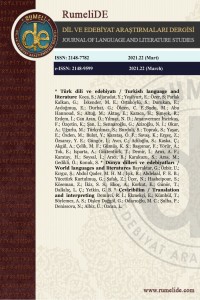Abstract
On dokuzuncu yüzyılın ikinci yarısı Osmanlı Devleti’nde birçok alanda yapılan yeniliklere sahne olur. Batı medeniyetini yakından takip eden Osmanlı aydınları, Batı’da siyasî alanda yeni bir sosyal düzenin kurulmasına öncülük eden Voltaire, J.J. Rousseau, Mostequieu gibi filozofların düşüncelerinden etkilenmişlerdir. Ülkenin meşruti bir yönetimle idaresi, Osmanlı aydınlarının siyasî alanda gerçekleştirmek istedikleri yeniliklerin başında gelir. 1876’da ilan edilip çok kısa bir süre yaşama şansı bulan I. Meşrutiyet’in ardından demokrasi mücadelesine devam eden Jön Türkler, 1889’da kurdukları İttihat ve Terakki adlı gizli bir örgütle yurt içinde ve yurt dışında faaliyet göstermişlerdir. Jön Türklerin demokrasi mücadelesi, şair ve yazarlar tarafından da desteklenmiştir. II. Meşrutiyet’in ilanıyla birlikte kimi yazarlar yayımladıkları romanlarda hem meşruti yönetimi desteklemek hem de II. Abdülhamit Dönemi’yle hesaplaşmak istemişlerdir. Bu yazarlardan biri de Servet-i Fünun Dönemi bağımsız sanatçılarından ve Zavallı Necdet yazarı olarak bilinen Safvet Nezihi’dir. Yazarlık serüveni basın-yayın üzerinde uygulanan bu sansürün en yoğun olduğu II. Abdülhamit Dönemi’ne rastlayan Safvet Nezihi, 1908’e kadar yazdığı romanlarda toplumsal konulara değinememiştir. II. Meşrutiyet’ten sonra yazdığı romanlarda ise istibdat yılları boyunca iç dünyasında biriktirdiği tarihî, siyasî sosyal ve kültürel konulardaki bütün düşüncelerini dile getirmiştir. Bu çalışmada, Safvet Nezihi’nin otuz yılı aşkın bir sürede Osmanlı Devleti’nde meydana gelen tarihî olayları ve kişileri, kurguyla nasıl harmanladığı gösterilmeye çalışılmıştır. Ayrıca yazarın yaşadığı devrin panoramasını çizerken üzerinde durduğu konular ele alınmış, Müsebbib’in aynı dönemde yayımlanan diğer romanlarla olan benzerlikleri ve farklılıkları üzerinde durulmuştur.
References
- Akyüz, K. (1995). Modern Türk Edebiyatının Ana Çizgileri 1860-1923, İstanbul: İnkılap.
- Aydın, M. (1994). “Doksanüç Harbi (1877-1878 Osmanlı Rus Savaşı)”, TDVİA, İstanbul: Türkiye Diyanet Vakfı, C.9, s.498-499.
- Çetin, N. (2017). II. Abdülhamit Dönemi Türk Edebiyatı, İstanbul: Nobel Akademik.
- Ertaylan, İ. H. (2011). Türk Edebiyatı Tarihi I-IV, Ankara: Türk Tarih Kurumu.
- Fazlı Necib (2020). Menfi, (Haz: Ömer Aslan), İstanbul: Türkiye İş Bankası Kültür.
- Gündüz, O. (2013). İkinci Meşrutiyet Romanı 1908-1918 Yapısal ve Teknik İnceleme, İstanbul: Dergâh.
- Karaalioğlu, S. K. (1980). Resimli Motifli Türk Edebiyatı Tarihi (Cumhuriyet Edebiyatı), İstanbul: İnkılap ve Aka, C.3
- Kudret, C. (2004). Türk Edebiyatında Hikâye ve Roman1, İstanbul: Dünya, C.1
- Necatigil, B. (2004). Edebiyatımızda İsimler Sözlüğü, İstanbul: Varlık.
- Safvet Nezihi (1910). Müsebbib, İstanbul: Suhulet......................
- Rauf M. (2001). Mehmet Rauf’un Anıları (Haz: Rahim Tarım), İstanbul: Özgür.
- Sevük, İ. H. (1942). Tanzimat’tan Beri 1 (Edebiyat Tarihi), İstanbul: Remzi.
- Tuncer, H. (1995). Arayışlar Devri Türk Edebiyatı 2 Servet-i Fünûn Edebiyatı, İzmir: Akademi.
- Yalçın M. (Ed.) (2003). Tanzimat’tan Bugüne Edebiyatçılar Ansiklopedisi, İstanbul: YKY, C.2
- Yılmaz, A. (1991). Safvet Nezihi Hayatı-Sanatı-Eserleri, Ankara: Hacettepe Üniversitesi Sosyal Bilimler Enstitüsü Basılmamış Yüksek Lisans Tezi.
Abstract
The second half of the nineteenth century witnessed many innovations in the Ottoman Empire. Ottoman intellectuals, who closely followed Western civilization were influenced by the ideas of philosophers such as Voltaire, J.J. Rousseau and Mostequieu who pioneered the establishment of a new social order in the political field. The legitimate administration of the country is one of the innovations Ottoman intellectuals wanted to realize in the political field. The Young Turks, who continued their struggle for democracy after the First Constitutional Monarchy, which was declared in 1876 and had the chance to live for a very short time operated in the country and abroad with a secret organization called Union and Progress that they established in 1889. The Young Turks’ struggle for democracy was supported by poets and writers. With the declaration of Second Constitutional Monarchy, some writers wanted to both support the constitutional administration and settle accounts with the Second Abdulhamit Period in their novels. One of these novelists is Safvet Nezihi, one of the independent artists of the Servet-i Fünun Period and known as the writer of Poor Necdet. Safvet Nezihi whose writing adventure coincided with the Second Abdulhamid Period, when this censorship applied to the press and publication was the most intense, could not touch on social issues in the novels he wrote until 1908. In the novels he wrote after the Second Constitutional Monarchy, he expressed all his thoughts on historical, political, social and cultural issues that he had accumulated in his inner world during the years of tyranny. In this study, it has been tried to be shown how Safvet Nezihi blended historical event and people in the Ottoman Empire over a period of thirty years. In addition, subjects that the author focused while drawing the panorama he lived were discussed, and similarities and differences between Müsebbib and other novels published in the same period were emphasized.
References
- Akyüz, K. (1995). Modern Türk Edebiyatının Ana Çizgileri 1860-1923, İstanbul: İnkılap.
- Aydın, M. (1994). “Doksanüç Harbi (1877-1878 Osmanlı Rus Savaşı)”, TDVİA, İstanbul: Türkiye Diyanet Vakfı, C.9, s.498-499.
- Çetin, N. (2017). II. Abdülhamit Dönemi Türk Edebiyatı, İstanbul: Nobel Akademik.
- Ertaylan, İ. H. (2011). Türk Edebiyatı Tarihi I-IV, Ankara: Türk Tarih Kurumu.
- Fazlı Necib (2020). Menfi, (Haz: Ömer Aslan), İstanbul: Türkiye İş Bankası Kültür.
- Gündüz, O. (2013). İkinci Meşrutiyet Romanı 1908-1918 Yapısal ve Teknik İnceleme, İstanbul: Dergâh.
- Karaalioğlu, S. K. (1980). Resimli Motifli Türk Edebiyatı Tarihi (Cumhuriyet Edebiyatı), İstanbul: İnkılap ve Aka, C.3
- Kudret, C. (2004). Türk Edebiyatında Hikâye ve Roman1, İstanbul: Dünya, C.1
- Necatigil, B. (2004). Edebiyatımızda İsimler Sözlüğü, İstanbul: Varlık.
- Safvet Nezihi (1910). Müsebbib, İstanbul: Suhulet......................
- Rauf M. (2001). Mehmet Rauf’un Anıları (Haz: Rahim Tarım), İstanbul: Özgür.
- Sevük, İ. H. (1942). Tanzimat’tan Beri 1 (Edebiyat Tarihi), İstanbul: Remzi.
- Tuncer, H. (1995). Arayışlar Devri Türk Edebiyatı 2 Servet-i Fünûn Edebiyatı, İzmir: Akademi.
- Yalçın M. (Ed.) (2003). Tanzimat’tan Bugüne Edebiyatçılar Ansiklopedisi, İstanbul: YKY, C.2
- Yılmaz, A. (1991). Safvet Nezihi Hayatı-Sanatı-Eserleri, Ankara: Hacettepe Üniversitesi Sosyal Bilimler Enstitüsü Basılmamış Yüksek Lisans Tezi.
Details
| Primary Language | Turkish |
|---|---|
| Subjects | Linguistics |
| Journal Section | Turkish language, culture and literature |
| Authors | |
| Publication Date | March 21, 2021 |
| Published in Issue | Year 2021 Issue: 22 |

